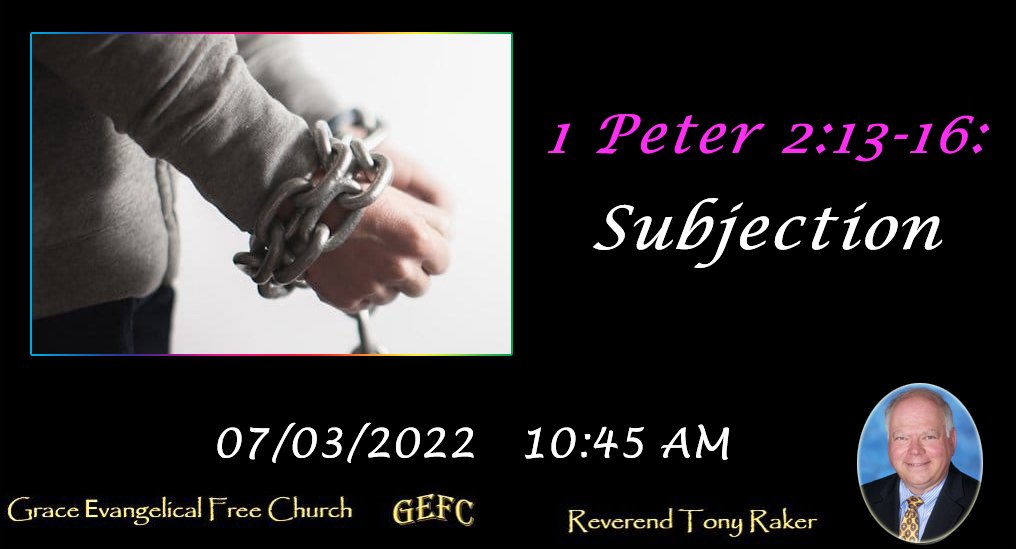All Sermons


1 Peter 2:13-16: Subjection
Government is a deeply biblical idea. When God put Adam and Eve in the Garden of Eden, he told them to subdue the earth. Government is one way to fulfill that command. The Bible continually reinforces the basic goodness of government…and our subjection.
- Contextual/Comparison: God keeps His Word: God continually uses His Word. Peter is starting a new section of his letter. So far, he’s talked about God’s mercy, starting in 1:3—“According to his great mercy, he has caused us to be born again”—and running to 2:10—“But now you have received mercy.” Now Peter aims to show how that mercy has a practical impact in the Christian life:
1 Peter 2:13a “Be subject for the Lord’s sake to every human institution…”
- Grammatical Usage: “Be subject” or in the Greek, “hupotassó” meaning, “to place under; to obey”; “sake” or “dia” meaning, “on account of, by reason of, for the purpose of”; “Lord” or “kurios” meaning, “master” in the sense of a person exercising absolute ownership rights.
- Literal Interpretation: “Place yourself in a position of obedience to authorities permitted by God for three reasons: on account of, by reason of and for the purpose of our Master who has absolute ownership of us.”
- Our motivating theme: “For the Lord’s sake” ( 13-14)
- A responsibility to live as a witness
- A witness for the Lord’s sake
- Submission to emperors and governors
When more and more people start respecting Jesus because of the actions of His followers we will know we’ve entered truly Christian politics. That is the upward call of Christ upon his people. For the Lord’s sake, not ours. For the name of Jesus, not our own name. And as we do this, we find a surprisingly secure foundation: God’s will.
- Our secure foundation: “The will of God” ( 15)
- Submitting to the government is not a step outside of Christianity; it’s a step inside of God’s will.
- Original Christians were viewed as deviant
- Doing good reversed attitudes
- Our submission is not out of fear but of strength
- Christian reasonableness stands against the prevailing image of unreasonableness
- Freedom is for serving, liberties are for laying down, not taking up at all costs.
- Our great advantage: “Live as people who are free” ( 16)
- We have an advantage non-Christians don’t: we can live as people who are free (Galatians 5:1)
- Our paradox: the only way for us to find this freedom is by coming under the rule of Christ; the Bible actually uses the word “slave”
- Honor everyone. Love the brotherhood. Fear God. Honor the emperor ( 17)
- We can use our freedom as a pretext for abusive, non-submissive talk or we can use it as a foundation for honor
- The call to fear God is placed in contrast to honoring the emperor
- We know where ultimate authority lies
- And where do we find ourselves in this world: suffering
- Peter’s words are not a pathway out of suffering, as if submission to the government will relieve the church of suffering. But it is a beacon of hope to a suffering world
- God ordained blessings of submission
- By submitting to Christ, we can bless the nation we live in
- We can provide a refuge for those lost and lonely
- We can be a people of healing and liberation and hope
- We can, in God’s mighty hands, be an outpost of heaven
- We can engage according to God’s will in the world of politics
- We can assure God’s name is no longer defamed in public for less-than-Christian actions
- We can shine as a bright light to the watching world
- We can offer a hope beyond this world that makes an impact on this world for Christ
- Conclusion: Do you belong to the party of Christ?
